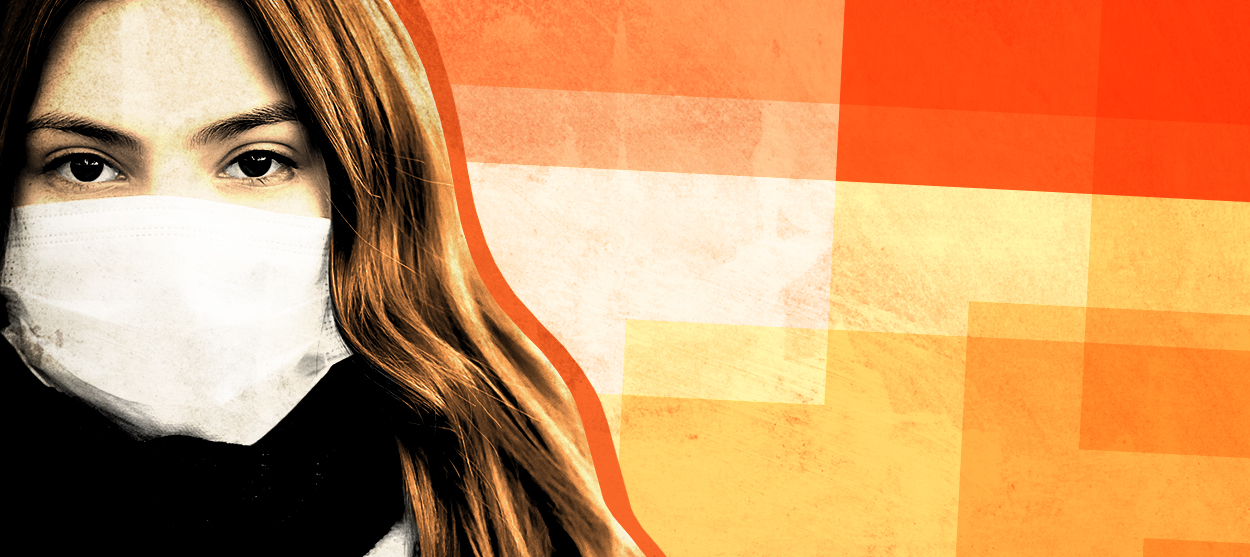How to convince teenagers to take COVID-19 seriously
This is not the time to be rebellious!


A free daily email with the biggest news stories of the day – and the best features from TheWeek.com
You are now subscribed
Your newsletter sign-up was successful
As confirmed COVID-19 cases continue to rise across the U.S., it can be frustrating to see people dismiss the official advice for curbing the spread of the pandemic. And when the resistance is coming from within your own household, it's even more infuriating.
Step forward Pandemic Teen — an even more irritating dependent than Regular Teen. It's natural for teenagers to push boundaries and question authority, of course. But if there's ever a time for them to skip the parties, stop sneaking out, and just do what you ask (i.e. wear the mask!), it's now.
"Infection rates among teens are going up," says Carol Winner, MPH, public health expert and founder of social distancing brand Give Space. "States like Florida and California are seeing cases among those under age 18 on a rapid rise — California is at a rate of 8 percent infection in that age group." Indeed, recent research suggests that kids between ages 10 and 19 are catching and spreading COVID-19 at the same rate as adults.
The Week
Escape your echo chamber. Get the facts behind the news, plus analysis from multiple perspectives.

Sign up for The Week's Free Newsletters
From our morning news briefing to a weekly Good News Newsletter, get the best of The Week delivered directly to your inbox.
From our morning news briefing to a weekly Good News Newsletter, get the best of The Week delivered directly to your inbox.
So how can parents get the message across to their teenagers that the pandemic is not to be taken lightly?
Part of the problem is that teens are naturally inclined to break the rules and assert their individuality. Blame it on their brains. "This is their primary developmental task," says child and adolescent psychiatrist and author Gayani DeSilva, MD. "They're also developing higher cortical structures and the ability to make complex decisions. They may still be thinking in concrete terms, and not able to consider situations and decisions in abstract ways. This makes their decision making seem superficial, or immature. It is — but they can't help it."
While the Centers for Disease Control and Prevention (CDC), and most state leaders, have issued rules regarding face coverings, social distancing, and hygiene, often the guidelines simply aren't clear enough for teenagers to understand. There's also the problem of information and guidance changing constantly, often without warning.
"The information teens get is confusing," Dr. DeSilva says. "They are natural risk takers, so unless they get clear messages about how to be safe, they will take risks and shun some good advice."
A free daily email with the biggest news stories of the day – and the best features from TheWeek.com
Part of a parent's role during the pandemic is helping their teen make sense of those conflicting messages. Dr. DeSilva recommends sitting down with them and explaining the risks of the pandemic in simple, straightforward terms, then telling them in clear language the behavior expected from them. And simple really does mean simple. Try something like: "We want you to wear a mask at all times when you're in public."
Like all productive conversations with a teenager, the key is to listen. "Ask them what they think. Ask them if they have concerns and what scares them. Ask them if they have questions about the pandemic and guidelines. Ask them what they want to do, and how they want to keep themselves safe," Dr. DeSilva says. Then, when you have their attention, tell them what's at the root of all this — you want them to be safe and healthy.
It's also important to remind teens of the greater good. They may perceive wearing a mask as a weakness because it doesn't look "cool," so emphasizing the sense of collective responsibility might be more effective than making it about them personally. "Social research tells us that although we may think of teens as being more self-absorbed than adults, they can often demonstrate empathy in a willingness to change their behavior for the betterment of the community," Winner says. Regular reminders that the sooner the virus is controlled, the sooner their freedoms will return could also help get the message across.
Teens need to understand that mask wearing isn't the only thing we should all be doing to gain control of COVID-19. The pre-teen or early teen years is a prime time for a reminder about defining personal space, so the social distancing aspect fits neatly into the wider conversation. "This is a topic that teens know a great deal about, as defining their space as to who is in it, and how and when, is important to them," Winner says. "Knowing that at least six feet of distance works to protect us from COVID-19 infection offers parents another teachable moment of self-advocacy for personal space that will last a lifetime. Empowering teens to politely tell others to please 'take a step-back' or 'give me space,' is critical now and will work to protect their safety and health in the future."
Finally, remember to follow your own advice. "Empathy is a learned behavior," Winner says. "COVID-19 offers a teachable moment to promote an empathetic response to the new normal of mask wearing and social distancing. It is always a win-win to praise your kids for respecting others."
Want more essential commentary and analysis like this delivered straight to your inbox? Sign up for The Week's "Today's best articles" newsletter here.
Claire Gillespie is a freelance writer with bylines on Health, SELF, Refinery29, Glamour, The Washington Post, and many more. She likes to write about parenting, health, and culture. She lives in Scotland with her husband and six kids, where she uses every (rare) spare moment to work on her novel.
-
 The ‘ravenous’ demand for Cornish minerals
The ‘ravenous’ demand for Cornish mineralsUnder the Radar Growing need for critical minerals to power tech has intensified ‘appetite’ for lithium, which could be a ‘huge boon’ for local economy
-
 Why are election experts taking Trump’s midterm threats seriously?
Why are election experts taking Trump’s midterm threats seriously?IN THE SPOTLIGHT As the president muses about polling place deployments and a centralized electoral system aimed at one-party control, lawmakers are taking this administration at its word
-
 ‘Restaurateurs have become millionaires’
‘Restaurateurs have become millionaires’Instant Opinion Opinion, comment and editorials of the day
